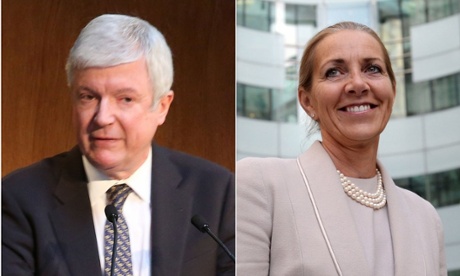
BBC director general Tony Hall said he had not talked about the BBC’s investigation into HSBC with Rona Fairhead, chair of the BBC Trust as well as a director of the banking group, as it was “not proper” for him to do so.
Fairhead, who became chair of the BBC Trust last October, joined HSBC as a non-executive director in 2004 and was chair of its audit committee at the time covered by the HSBC files. She was paid a total of £513,000 by the bank last year.
Asked whether Fairhead had ever talked to him about HSBC and the BBC’s coverage, Hall said: “No, and we have been absolutely clear without actually talking about it that it is not proper for her to talk to me about anything to do with HSBC when we are investigating HSBC, a major investigation by Panorama.”
Hall told Radio 4’s World at One: “Of course I didn’t talk to her about that and I haven’t.”
The HSBC files – obtained through an international collaboration of news outlets including the Guardian, the French daily Le Monde and BBC1’s Panorama – revealed last month that its Swiss banking arm had helped wealthy customers dodge taxes and conceal millions of dollars of assets, doling out bundles of untraceable cash and advising clients on how to circumvent domestic tax authorities.
Earlier on Monday, talking about the BBC’s “tradition of standing up for consumers”, he mentioned Esther Rantzen’s programmes, such as That’s Life, and another BBC1 programme, Watchdog, before seguing into “our reporting of HSBC on Panorama two weeks ago”.
The House of Commons culture, media and sport select committee said last month that the BBC Trust, overseen by Fairhead since her appointment last year following the unexpected departure of Lord Patten, should be abolished.
Asked about its proposed demise, Hall said: “I really can’t comment on the body or the person chairing that body who is regulating what I do, that wouldn’t be right.
“What I will say is the chairman of the trust and myself are working really hard and well together to ensure real clarity between what the trust does and what the BBC as an organisation does, we are making real progress there, there is a lot of common ground.”
Earlier, the BBC Trust had said about Fairhead’s dual role: “Rona Fairhead has made absolutely clear that she prioritises her role as chairman of the BBC Trust and her other roles do not present any conflict of interest.
“The BBC Trust has no involvement in day- to-day editorial decisions, including individual news stories, and Rona has not had any discussions with the BBC – the executive or editorial – regarding HSBC coverage.”
Hall was also asked in the BBC interview about the select committee’s proposal to follow the Germany system of a domestic levy on all homes, to replace the licence fee, which presenter Martha Kearney compared to a “form of poll tax”.
Hall said the household levy proposal was “really interesting and should be explored”.
Challenged that it would be unfair on homes that did not use any BBC services, Hall responded: “But 97% of the people in this country are using the BBC each week, so actually in terms of fairness it seems to me that would be one possible route.”
Asked about another of the committee’s suggestion, that more of the licence fee should be used to fund public service content by other providers, Hall said: “If you want to top-slice even more of the BBC, then you also have to be able to answer the question, what is it of the BBC you would lose to fund that top-slicing?”
He added: “There is something profoundly democratic about the BBC. I believe everybody in this country has a right to information which is impartial and gathered without fear or favour. Everybody has a right to great content, that right is part of our citizenship in a way. That is what the BBC offers.”
In a digital world where things are becoming more personal, Hall said: “Things which bring us together and unite us are at a real premium and that’s where the BBC comes in.”

